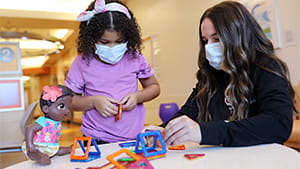About Creative Arts Therapy
It can be hard for children to process their feelings when they’re facing medical treatments and a hospital stay. It’s equally hard for parents to cope with feelings of fear or anxiety while trying to stay positive.
That’s why Cincinnati Children’s offers creative arts therapy to many of our patients and their families. Studies have shown that creative arts therapy can help:
- Lower anxiety and stress
- Reduce pain and discomfort
- Improve mood
- Improve sleep
Creative arts therapists are members of the treatment team. They can help children grow their creative abilities and connect with the healthy parts of themselves.
During your hospital stay, you may have the opportunity to work with a professional who uses music or art as a form of therapy.











